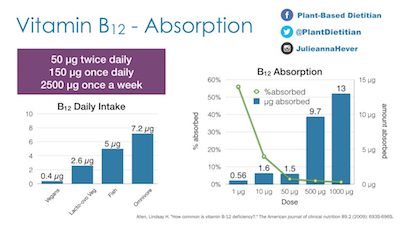Vitamin B12 Recommendations
Vitamin B12 Recommendations on a Plant-Based Diet
A plant-based diet has been shown time and time again to be the most health-promoting, disease-fighting, and nutrient-dense way of eating possible. Emphasizing a wide range of vegetables (especially leafy green varieties), fruits, whole grains, legumes, nuts, seeds, herbs, and spices makes it simple to achieve nutrient needs while avoiding chronic overnutrition. Guides such as the Plant-Based Food Guide Pyramid and Plate, 6 Daily 3’s, and Notable Nutrient Chart help with the high level view of what exactly a day-in-the-plant-based-life may look like. As does this post of Everything You Need to Know About A Plant-Based Diet in Less Than 500 Words and Sample Meal Plans Made Simple + Hundreds of Recipes.
One nutrient that likely will fall short on a plant-based diet is cobalamin, commonly referred to as vitamin B12. B12 is produced by microorganisms, bacteria, fungi, and algae, but not by animals or plants. B12 is found in animal products because they concentrate the nutrient after ingesting these microorganisms along with their food in their flesh, organs, and byproducts (e.g. eggs and dairy). Also, ruminant animals (such as cows, sheep, and goats) have bacteria in their rumen that produce vitamin B12.
In a vegan diet, vitamin B12 may be found in fortified plant milks, cereals, and other foods, such as nutritional yeast. However, if vegans are not conscientious about taking in the recommended dietary allowance (RDA), there could be harmful health consequences. Deficiency can result in potentially irreversible neurological disorders, gastrointestinal problems, and megaloblastic anemia. B12 deficiency is not unique to vegans who do not supplement. Deficiency is also a concern with aging, medication use, and gastrointestinal issues. So much so that it has been recommended that all adults over the age of 60 years supplement to avoid deficiency.
Interestingly, the body is able to store B12 for upwards of even ten years. To further complicate this, signs and symptoms for deficiency are either not noticeable or simply very subtle. So, if B12 is not being taken in at adequate levels or if there are absorption problems, deficiency will eventually ensue. Because blood tests for B12 levels can be skewed by other variables, irreversible damage may occur before a deficiency is detected.
RDA’s for vitamin B12 across the lifespan can be found in detail here. For non-pregnant adults, aged 14 and above, the RDA is 2.4 micrograms per day. To ensure this is absorbed (in a healthy individual, barring any possible inhibitors), higher doses are recommended.

The bottom line is that it seems the best way to supplement to maximize absorption and maintain optimal blood levels of B12 is for vegan adults (as well as non-vegan adults over the age of 60) should consider supplementing with these doses of vitamin B12:
- 50 µg twice a day OR
- 150 µg once a day OR
- 2,500 µg once a week
High doses of B12 are safe and there isn’t a tolerable upper limit that has been established. It is best to undergo testing regularly and adjust the dose as necessary.
